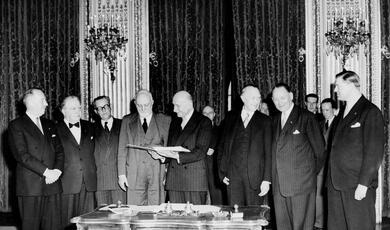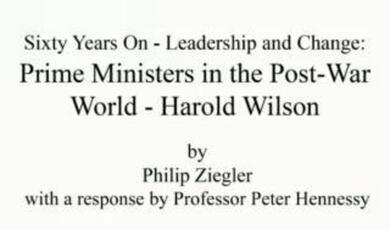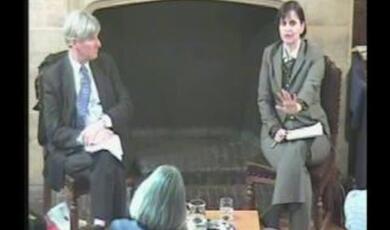Humour and satire as the canary down the mine shaft of government
Share
- Details
- Text
- Audio
- Downloads
- Extra Reading
Laughter may not be the most obviously fearsome weapon in the hands of governments or citizens, but it is one which political leaders seem to dislike to a surprising degree. Why are public figures so sensitive to satire, and are there public figures who are not?
Download Text
Humour and satire as the canary down the mine shaft of government.
Professor Rodney Barker
Laughter may not be the most obviously fearsome weapon in the hands of governments or citizens, but it is one which political leaders seem to dislike to a surprising degree. Why are public figures so sensitive to satire, and are there public figures who are not?
1. Saddam and Churchill.
*1 PICTURE
Winston Churchill so disliked the painting of him by Graham Sutherland, that it was destroyed on the orders of his wife, Clementine. When Mahir Hassan Rashid’s satirical film of the Saddam Hussein regime was shown on TV in northern, Kurdish controlled, Iraq, the alleged response of Saddam Hussein was to send a team of assassins north to eliminate the entire cast. The actor/comedian who played Saddam Hussein then had six attempts on his life in the next four years.1 Paintings may not always be safe under democracy, but in general painters are.
The interesting question is not why Churchill’s portrait was the only casualty, but why it mattered so much to Saddam Hussein. What is it about ridicule that is so threatening even to those who have a ruthless monopoly of coercion? We might have expected a political leader, Churchill, in a society where political leadership depended on free support and consent, to be more worried by what he considered an unflattering portrayal, than a leader who seemed to have no need of the willing agreement of his subjects.
So the first question is ‘what is it about political humour, satire, that is apparently so effectively unsettling for rulers?
Why are public figures so sensitive to satire?
What is the role of satire in politics?’ ‘How efficient is it?’
The second question is where can we expect it to work, and where does it occur, and where does it not occur?
Are there public figures who are immune?
Are some more sensitive than others?
For the citizen that involves the entirely practical question of when can we expect it to be safe, and effective, to laugh at our rulers, and when is it wiser, indeed necessary for survival, to keep silent?
2. Is satire effective, and if so, why?
In Umberto Eco’s The Name of the Rose, the thing which the monk Jorge, the defender of the status quo, most feared and set out to suppress, was Aristotle on Humour. Laughter may not be the most obviously fearsome weapon in the hands of citizens, but it is one which political leaders seem to dislike to a surprising degree.
Being in coercive physical control seems never to be enough, and all rulers fear the voice of the small boy who cries out that the emperor’s clothes are not as substantial as claimed. And satire not only says that the emperor has no clothes, but that it is possible to laugh at the ones that he does have.
There are a range of actions where citizens may express a sceptical distance from those in positions of formal authority: carnival and the various forms of festivals of misrule, in which conventional authority is inverted; satire and the heckling of politicians; derisive or humorous election candidatures such as those of The Monster Raving Loony Party in the United Kingdom. Each of these says to government, in effect, we are keeping an eye on you, and we won’t necessarily accept without question what you tell us, or approve without enquiry what you do or propose to do.
Take the toys from the boys is an effective feminist deflation of military gravitas in a democracy. When John Humphries, interviewing Tony Blair on the Today Programme, suggests that if the military threat from a middle eastern nation were ever again used by the government as a reason for the UK to commit its troops, everyone would laugh, the Prime Minister was disconcerted but no more. But if Humphreys was right, it was real check.
Satire can limit what governments can get away with: Orwell and goose stepping
3. Satire can be vernacular politics rather than elite politics
This does not mean that it is ‘the true voice of the people’. But it can be another voice, the vulgar, untutored voice of the small boy or the peasant. It means, too, that it can be sometimes offensive, tasteless, and not always successfully funny:
Satire against Queen Victoria and Albert, the elitist snobberies to be found in Private Eye, can be crude and offensive. Such unpredictability and freedom from the constraints of good taste is the price to be paid for internet sites such as * The Onion from the USA,
* 2 PICTURE
Private Eye in Britain *PICTURE 3
or The Portadown News from Northern Ireland, which was so effective, or offensive, according to your tastes, that it managed to enrage both unionists and nationalists. W. C. Fields remarked that no one who hated children and dogs could be all bad. One might say equally that no one who manages to infuriate both Ian Paisly and Gerry Adams can be wholly without merit.
4. Satire can enable things to be said which cannot be said
Satire enables messages to be passed in code which could not be passed directly (‘Gay, fun-loving Miss Gaye Funloving’)
Even open societies limit speech by laws of libel and slander, but there is a frontier here which the smugglers of political information can sometimes cross to our advantage.
5. Masked satire, the lords of misrule
When laughter is dangerous, it can be presented in a form so outrageous that, as a brief departure from the manners and conventions of daily life, it can, at one level, be dismissed as a brief but temporary excess, a reversal of the normal but not, by that very fact, a threat to it. That is the character of carnival and of the various festivals in medieval and later Europe where lords of misrule of one kind or another parody the normal hierarchies of church or state, but only for a day.
But such a form of cocking a snook at authority can be unstable, either so bizarre but so harmless that it does indeed serve to contain resentment and justify the continuation of the existing order of things, or the resentment which it briefly masks is so intense that, as in Romans in southern France at the end of the Sixteenth Century, it becomes the vehicle and springboard for rebellion, or is feared to be about to become that so that in revolutionary France, the authorities banned the wearing of masks and carnival cross dressing as concealing counter-revolutionary or royalist intent (Hunt 66-7)
6. Rulers can’t do humour
So the answer to the first question is that rulers dislike satire because it can call them to account. It is also one of the few political devices which rulers are unable effectively to use themselves. Satire both illuminates and excludes them.
Because satire comes from below, and attacks precisely things that are settled, established, dignified, in control, it is necessarily subversive.
When it is not, when it is attempted from above, it can too easily appear tasteless or triumphalist. The inability of rulers and leaders to be funny (though they can say funny things: Blair, Kinnock, Hague) Official cartoons are solemn or vindictive, and when political parties satirise or stigmatise, they are more often vituperative or fanatical, than amusing. British government cartoon posters of the First World War, or Nazi propaganda in the years leading up to and during the second, were unpleasant, but not usually funny. But the further they move towards artistic responsibility, and the more stages there are between them and their official patrons, the more amusing and undeferential they are capable of being. The heavy hand of official humour: ‘chemical Ali’ or ‘Doctor Germ’ somehow lack the easy zing of ‘the toxic Texan’ or ‘Blairforce one’, and the denunciations of their opponents by totalitarian regimes, as traitors, running dogs of capitalist imperialism, or subverters of the nation’s heritage, almost always lack any style, wit, or humour.
Since the essence of satire is to deflate those persons and institutions who take themselves over-seriously or with great gravitas, gravitas is not the best place from which to generate or direct it. And it can do it without the malice which seems to sit more easily with ‘official’ satire.
There is a difference between satire and demonisation
*4 PICTURE
Low’s regular characterisation of the Labour and then National Government Minister, the railway trade unionist Jimmy Thomas, who had a predilection for the high life, as ‘The Rt Hon Dress Suit MP’ was not unkind, but was certainly effective and to the point.
*5 PICTURE
7. But no rigid division
But rigid distinctions are usually too simple. If there is a scale, with the solemnity of ‘official’ humour at one end, and the lightness of ‘vernacular’ humour at the other, there is too a distinction between the humour associated with closed systems and that associated with open ones. Britain during the First World War could produce the cartoons of Bruce Bairnsfather who, despite his semi-official status, could present the life of the ordinary infantry soldier in humourous rather than heroic terms.
*6 PICTURE
* 7 PICTURE
In the Second World War, posters warning that ‘careless talk costs lives’ could, as well as taking the dramatic form of lurking spies and deadly gossip, portray the Nazi leadership, Hitler and Goering, as cartoon characters sitting listening on a bus.
8. When does humour work?
There is something of the relation between overdrafts and credit worthiness here: the only people who can get them are those who don’t need them. Humour is only an effective weapon against regimes and governments who, whilst they do not like it, do not find it intolerable. Satire is an instrument of democracy, and one which will work only in democracies. So paradoxically, whilst it may be a defence against bad government and an incitement to good government, it works best where government is already at the good end of the scale, and hardly works at all where it is most needed.
There is therefore, for those who seek satire as the secret weapon of democrats, a problem, in that satire is most effective in regimes against whom it is least necessary. Satire is a resource of citizens, rather than of those who are deprived of citizenship. So its presence is in part a symptom as much as a cause of open and intelligent politics.
9. Where is satire found, and what does its distribution tell us?
John Stuart Mill suggested that it was possible to gauge the extent of freedom in a society by the number of eccentrics it contained. The point applies equally to sceptics and satirists. One mark of the position of a state on the scale from despotism to openness and democracy is the absence or presence of satire, and the response of rulers to ridicule, as is their attitude towards free expression in general.
Conversely, one mark of the character of a body of subjects or citizens is the authority with which its members say and do whatever they please. There are many reasons to be sceptical about the effects of the world wide web, but even so the number of internet cafés in a country is probably a better rough guide to the reality of its freedoms, than the formal clauses in its constitution.
10. Democracy
In democratic or open societies, the leadership is subject to constant scrutiny, criticism, and, of course, praise and commendation. Its continuation in office depends not on universal and unqualified approval, but on free election, and the certainty that however firm its hold on office, it is on approval till the next vote. Criticism, and therefore satire too, is an essential aspect of the conditions which justify the existence of such a government. And such free voicing of criticism, enquiry, and dissent is necessarily both variegated and changing. There is no one unfaltering voice of the people, but a medley of voices and views.
So one or many critical or satirical voices may not be comfortable, but they do not call the entire basis of rule into question.
It may even be the case that there is only one thing worse than being talked about, and that is not being talked about.
Norman Tebbit and Spitting Image
Certainly nothing is off limits: monarchy, church, armed forces
*8, 9, 10 PICTURES
11. Distrust and democracy
Distrust is thus not only a recurring but an inherent feature of democracies and open societies. Caveat emptor is a respectable principle in commerce. It applies equally in political life. Ridicule is no more than the vigorous expression of distrust, which as Vivienne Hart has argued, is a valuable, perhaps a necessary, stimulant to democratic politics and the government of democracies. 2
12. Despotism
Satire does not bring down governments, but it can change the agenda, and the perceptions both of citizens AND of rulers. This in part explains the differences in the reactions of Churchill and Saddam Hussein to unfavourable representations of themselves.
The position of closed societies, theocracies, absolute monarchies, military dictatorships, is quite different. The claim to power is absolute. The government is saying in effect that there is only one truth, or one national destiny, or one civilisation, and that they are uniquely placed to understand what it is and how it is to be pursued or preserved. The ordinary inhabitants of the state, subjects rather than citizens, have by definition only an imperfect understanding of such things. So the difference between rulers and ruled is absolute.
In such a system, any criticism, any ridicule, questions the entire basis of government. It is precisely because the claim to power is unqualified, that any qualification threatens it.
The mere existence of an alternative account of the world or an alternative way of living is a threat: Falun Gong, China
13. Democracy & despotism compared
In an autocracy it is a challenge to the entire system. A democratic leader can afford to be laughed at. There is no equivalent to the Today Programme in China or Zimbabwe.
14. Two dangers of satire?
There are two contrary dangers to be avoided.
Satire subverts
One is the claim that satire is dangerous, and subversive of the respect that is necessary to make government and orderly public life possible. This is the argument of those North American conservatives – in the lower case sense of that title – who in the 1970s argued that there could be too much citizen participation, and that an obedient citizenry was to be sought rather than an active one: Samuel Huntington wrote in 1975 that 'The essence of the democratic surge of the 1960s was a general challenge to existing systems of authority, public and private. In one form or another, this challenge manifested/itself in the family, the university, business, public and private associations, politics, the governmental bureaucracy, and the military services. People no longer felt the same compulsion to obey those whom they had previously considered superior to themselves in age, rank, status, expertise, character, or talents. Within most organizations, discipline eased and differences in status became blurred. Each group claimed its right to participate equally - and perhaps more than equally - in the decisions which affected itself.'.
Clearly a total disregard for all conventions and rules would dissolve society. But those who see themselves as both commanding and enjoying an existing order can sometimes have difficulty distinguishing between criticism and a lack of deference, and insurrection and revolution.
Satire diverts
The other danger is that satire is dismissed as not serious politics. This was the objection of some on the left to George Bernard Shaw: by laughing at evils, we accept and come to tolerate them. Can satire function in a similar way to sour grapes, as a sufficient response to what we fear, despise, or disagree with? Does laughter necessarily not only ridicule, but trivialise?
Satire can also be, in the manner of Simmel, an alternative to conflict, the lords of misrule being a way of expressing resentments whilst making their causes acceptable, lords of misrule being the alternative to alternative lords, and rebellion.
Is satire a diversion, a kind of bread and circuses to keep the intellectuals happy? It can certainly be an alternative to wounding attacks. In the House of Commons, William Hague as Conservative leader was consistently witty and often devastatingly satirical at the expense of the Prime Minister, Tony Blair. But this did not markedly help the party in opposition in either hampering or embarrassing the government, or in advancing their own electoral fortunes. It may be that, to be effective, satire has to come from outside the circle of the powerful, otherwise it appears to ordinary citizens little more than a private fight.
Getting the balance
Dissent and democracy: the balance. The excesses of each side
Respect for rulers and respect for oneself. Tawney and telling people to go to Hell but they are under no obligation to do so
15. Conclusion
The problem with the canary metaphor is that if there is gas down there, the canary is dead. Laughing at a government to test it’s liberality can be a dangerous piece of political litmus testing, since the satirist is the litmus paper, and may end up just like the canary, if not gassed, then at least caged. The choices for the sceptical citizen at the two extremes of the spectrum are clear enough. No one would hesitate to publish satires of their rulers in the Europe or North America. It would be unwise in China or Zimbabwe. But it is precisely where the atmosphere needs to be tested, and where there is an unstable mix of democracy and autocracy, liberty and control, in Turkey, for instance, or Iran, that whilst the test may be of the greatest values, the danger to the brave canary is greatest. We may not think of comedians, in the broadest sense of the word, as the front line troops in the war for liberal democracy. But they can often be the forward patrols who test the terrain, with all the dangers that entails. They deserve our support and our gratitude, as well as just our laughter.
1 Luke Harding, 'The Joke's on Saddam', The Guardian, G2, (Friday 14th March 2003), p.5.
2 Vivien Hart, Distrust and Democracy, (Cambridge, Cambridge University Press, 1978)
© Professor Rodney Barker, Gresham College, 5 December 2006
This event was on Tue, 05 Dec 2006
Support Gresham
Gresham College has offered an outstanding education to the public free of charge for over 400 years. Today, Gresham College plays an important role in fostering a love of learning and a greater understanding of ourselves and the world around us. Your donation will help to widen our reach and to broaden our audience, allowing more people to benefit from a high-quality education from some of the brightest minds.


 Login
Login







